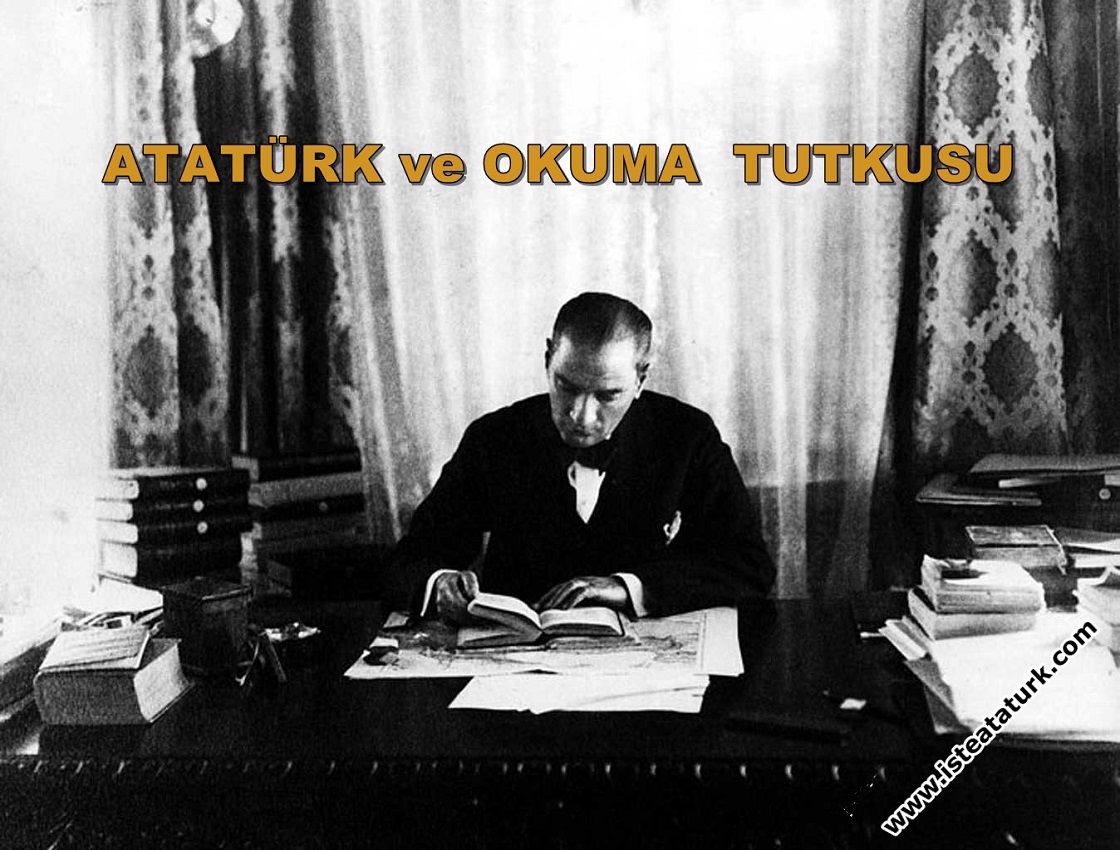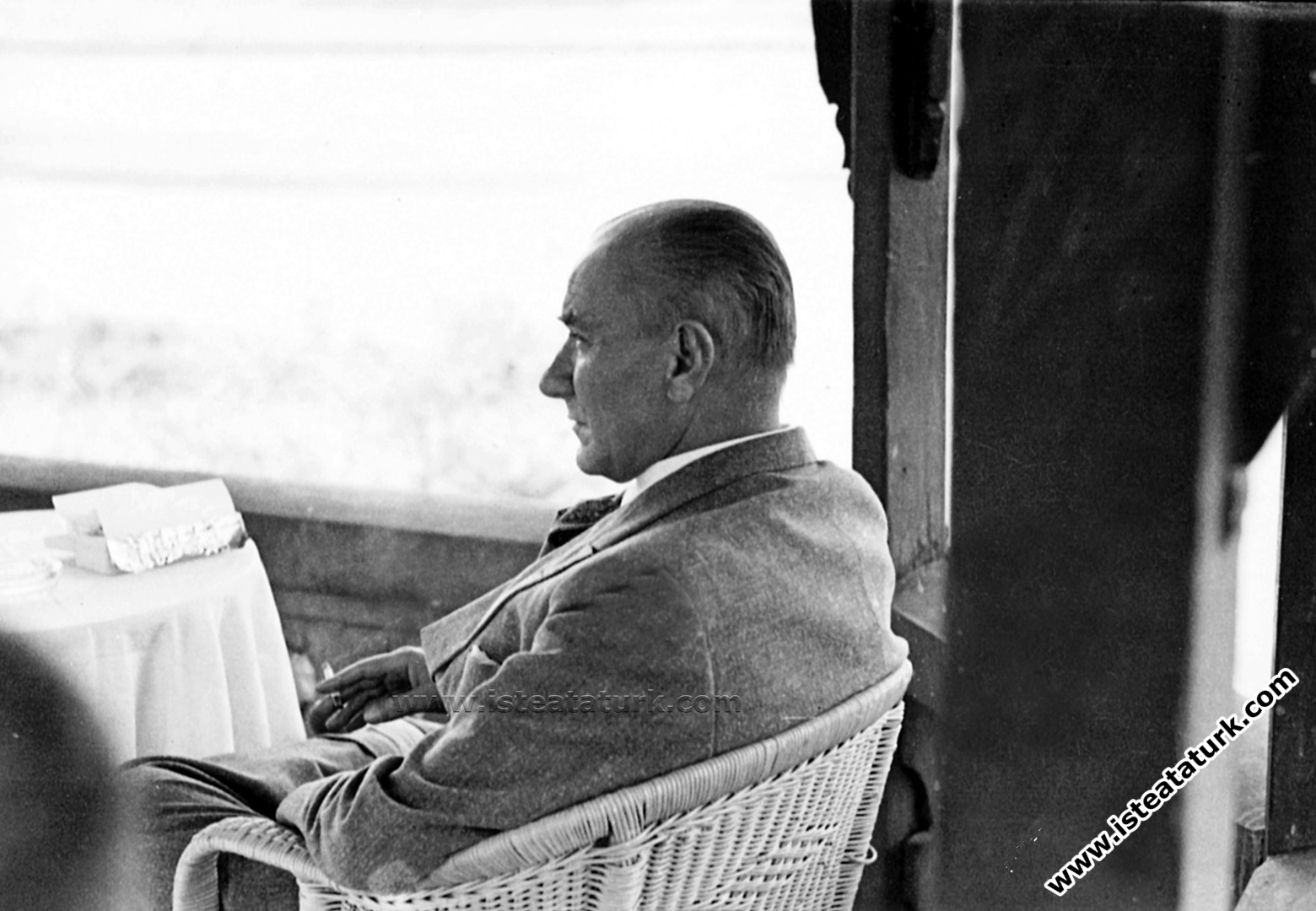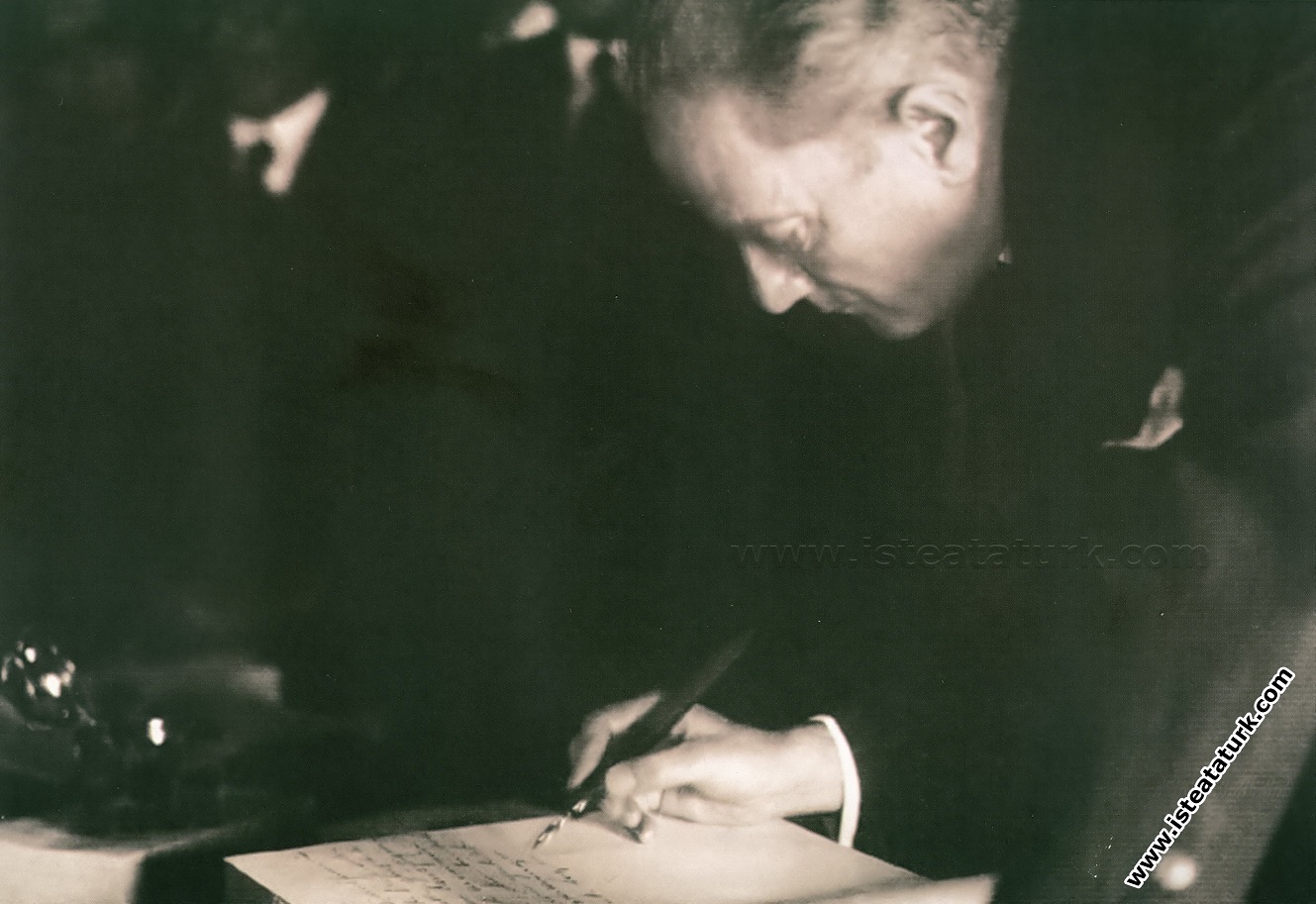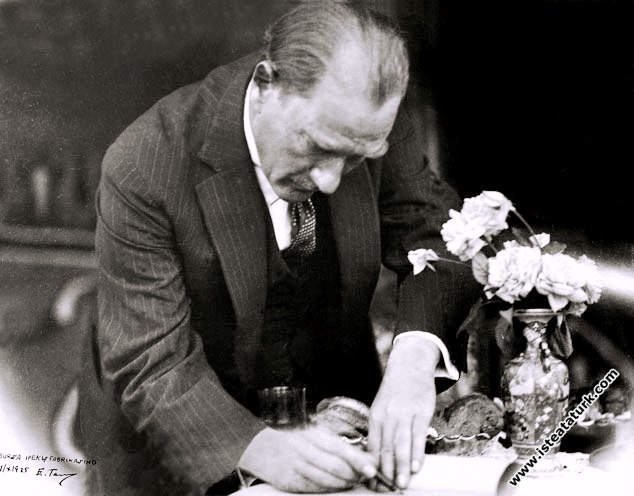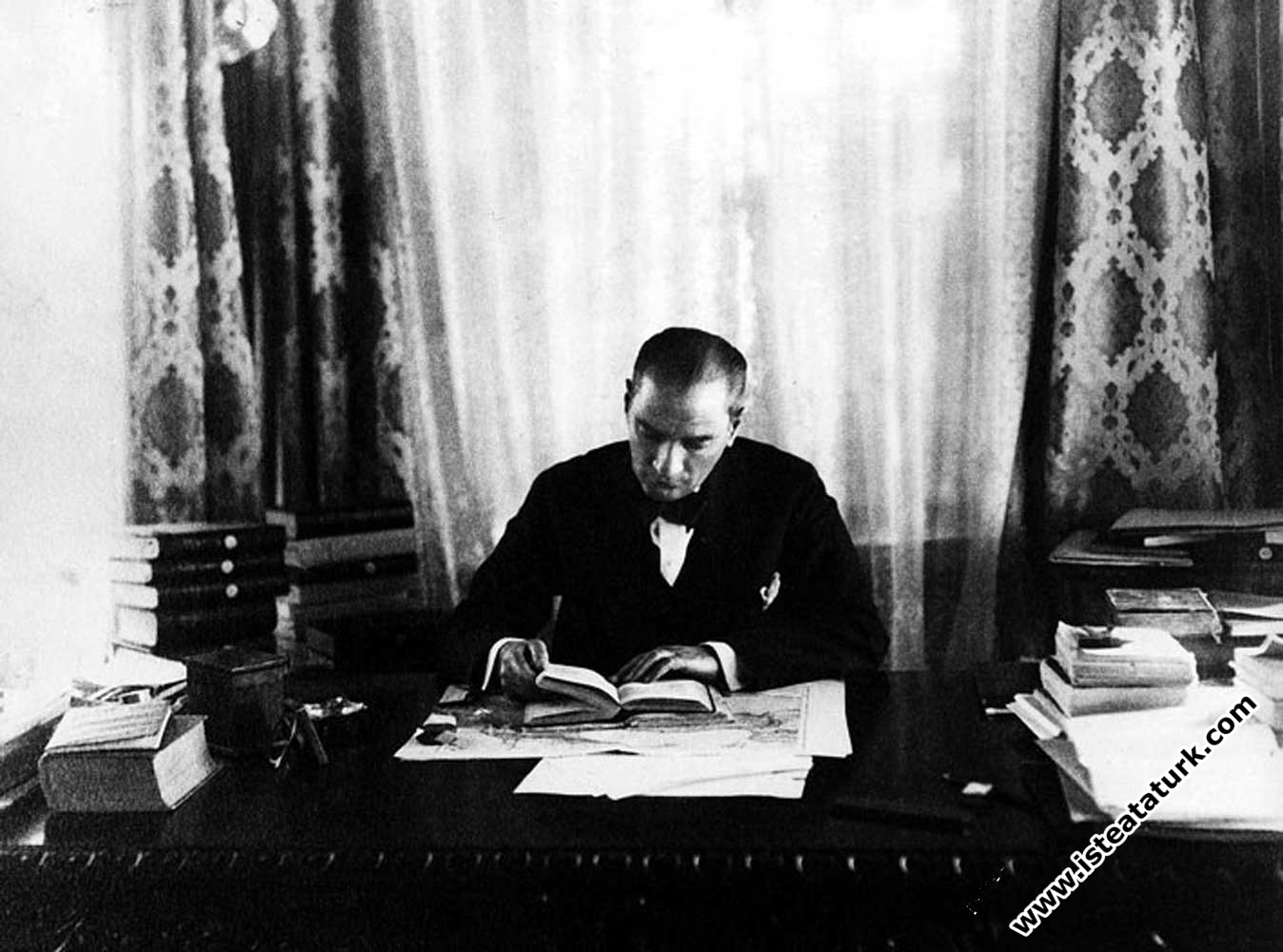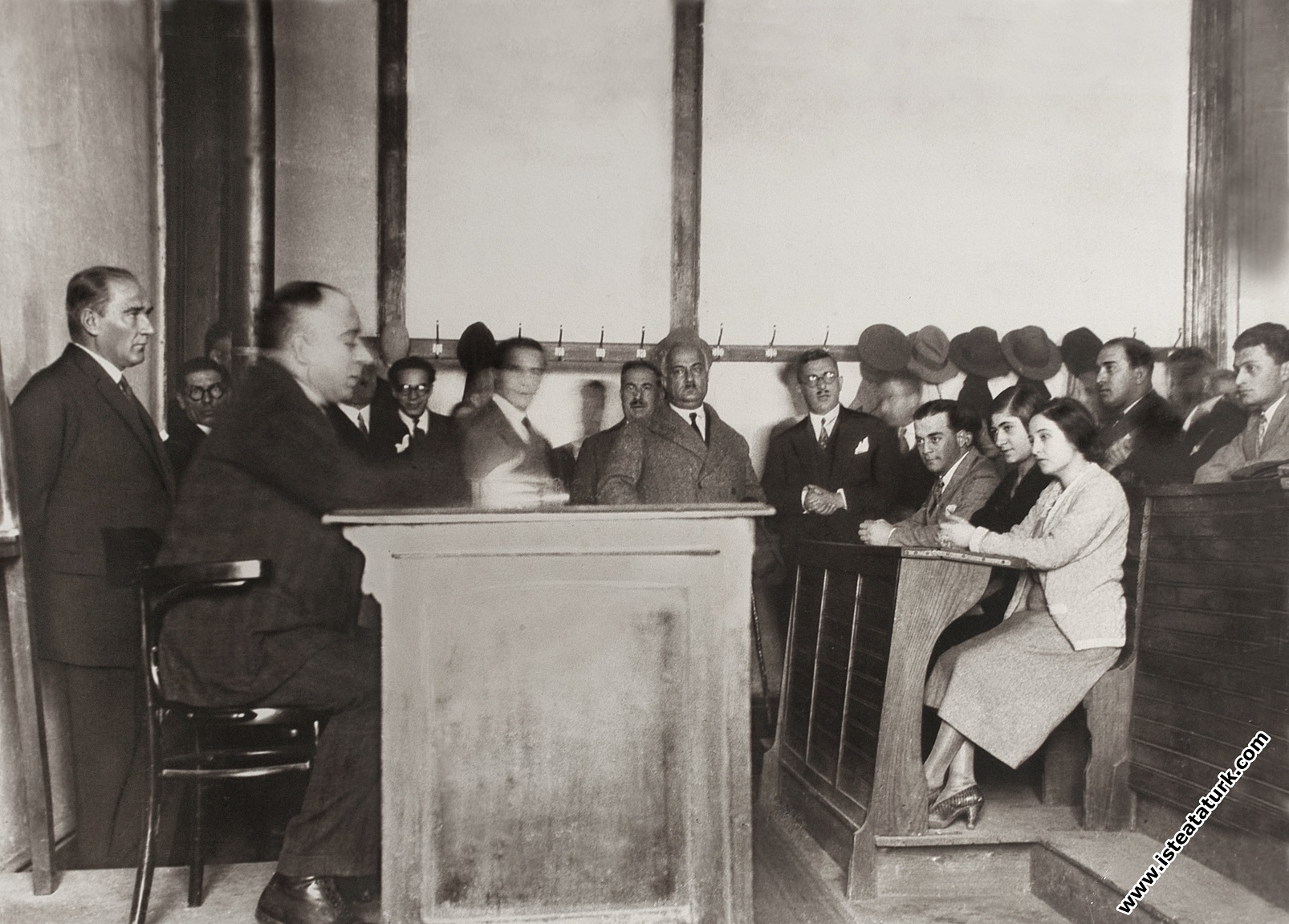
Atatürk, Science and University
Character Size
Atatürk, Science and University
ATATÜRK, SCIENCE AND UNIVERSITY
While pointing out the exceptional place of Atatürk in Turkish history, the first thing that comes to mind is that he is the "leader of modernization", as well as the qualities of "savior of the homeland" and "founder of the state". So much so that this last feature has made it a model not only for Turkey, but also for other societies on the path of modernization. In fact, modernization has always been on the agenda since 1683, when the Turks turned away from the walls of Vienna. As a matter of fact, Atatürk has been closely related to the subject since his youth. The events that happened before him, the experiences made, the books that Atatürk grew up in, the books he read, the experiences and observations he gained in public duties had a great effect on the formation of Atatürk's ideas on this subject.
While evaluating Atatürk's attempts at modernization (university reform is one of them), it should be remembered that Turkish society had a trial period of approximately 200 years before Atatürk. In this period from 1718 to 1918, Europe's indisputable superiority in the military field was seen first, so it was desired to make quotations in fields related to military technology. However, it was seen that the acquisition of military technology would be through school, hence science, and modern military schools were opened for this purpose. These were followed by civil vocational schools.
With the embassies and translation rooms made permanent and foreign language learning, the innovation movement has left the field of military and national education and turned to a new political order. This development became evident with the Tanzimat and turned into serious steps in this direction in the 1876 and 1908 Constitutional periods.
Have these innovation movements, which lasted for about 200 years, the last years of which Atatürk also realized, achieved the desired result? If not, what are the reasons? How did these reasons affect Atatürk's approach to the event?
It is a fact that Turkish society, in the aforementioned period, oriented towards the west, with its military and civilian schools providing modern education, laws taken from the west, the courts of law operating according to these, and the understanding of the parliamentary regime, which cannot easily go back. However, what was done could not save the State from collapse, and the crises that intensified in the 1908s led to the collapse of the empire.
What are the causes of failure? Do these have any effect on Atatürk's attitude?
This statesman, who wanted to innovate in the specified period, tried to buy something from the west to the extent of his own understanding and understanding. However, the discussion of “non-continuity” and what to take and “what should be left” continued until Atatürk and prevented a systematic innovation.
As a result, over time, a culture and civilization doubling, even conflict, has occurred in the society. Therefore, it has not been possible to preserve the old and fully embrace the new.
The First World War, which was entered into without precaution and untimely in this environment, ended with the liquidation of the Empire and the encroachment of the motherland from all sides.
After drowning the enemy in the name of the holy Anatolian sanctuary, Atatürk's main goal is to take the necessary measures so that the state does not fall into the same situation again and can live forever. The aim of these measures, which we call Atatürk's reforms, is to make the Republic of Turkey a partner of contemporary civilization as a whole and as soon as possible. It has been adopted as a life-and-death policy for the new Turkish Republic to cite contemporary civilization in its entirety. While Atatürk was making decisive moves in this direction, he did not favor the "culture-civilization distinction" as the old people did, but took contemporary civilization as a whole with a rational and pragmatic approach, as he generally adopted, and considered "total innovation" an "indispensable condition for success". Therefore, according to the innovation movements before it, Atatürk's reforms are of a radical nature and target deep-rooted regulations. As a matter of fact, it is necessary to examine the university reform that we will talk about within this framework.
As it should be remembered, the formation of modern civilization, the foreground of rational thought in the life of ideas and thought, in other words, the "science mentality" has been possible with the establishment of the mind. As a matter of fact, higher scientific institutions have taken the lead in this regard.
Therefore, the road to modern civilization passes through technology, which consists of the application of science and its practice, and which makes human beings dominate nature.
Atatürk, who has a rational and positivist mindset, shows that science is the best way to guide Turkey. He conveys this view to the masses with his strong expression. As a matter of fact, three months after the Great Victory, he calls out to the teachers in Bursa:
“We cannot close our eyes and pretend that we live in isolation. We cannot encircle our homeland and live without any connection with the world… On the contrary, we will live on the field of civilization as a progressive nation. This life is only possible thanks to science. We will take science and science from wherever it is and we will put it in the minds of every individual nation, there are no conditions or conditions for science and science”. In the same speech, "science and science will be our guide in the political and social life of our nation and in the intellectual education of our nation."
Addressing the teachers in Samsun on September 22, 1924, he said, “ For everything in the world, for civilization, for life, for success, the most true guide is science. It is heedlessness, ignorance, and signification to seek a guide other than knowledge and science,” he expresses his thoughts on this issue in the clearest and most precise way. Finally, in his Tenth Anniversary Speech, he expresses in a way that leaves no room for doubt, the way in which a solution to our problems should be sought, with the words “The torch that the Turkish nation keeps in its hands and minds on the way of progress and civilization” . The places where positive science, which Atatürk defined as “the most genuine guide is science”, is produced are universities.
At that time, Turkey had only one university: Istanbul Darülfünunu. With the structure of the Darülfünun at that time, is it in a position to respond to the needs and breakthroughs of Turkey, which was experiencing Atatürk's reforms? It is not. Therefore, Darülfünun is expected to renew itself by giving new opportunities during the ten years from 1922 to 1932.
First of all, the old War Office building was allocated to Darülfünun. Then, in 1923, a significant increase was made in the salaries of professors, and in 1924 Darülfünun was given the right to own foundation properties. With the law numbered 499 and 21 April 1924, Darülfünun is recognized as a legal entity and administrative and scientific autonomy is given with the 7 October 1925 directive. According to this instruction, the Emini of the Darülfünun will be chosen by the Ministry of National Education among the two candidates who will receive the most votes, to be elected by the professors and teachers.
As a result, in the period from 1922 to 1932, the government did not interfere with the teaching and program of the Darülfünun and waited for developments from the university.
However, in Darülfünun, Turkey does not see any suitable activity going on, and events that are contrary to the revolution occur. For example, students who took pictures in the garden of Darülfünun in 1924 were punished by the administration. The incident caused a reaction in Ankara. Some student incidents that took place afterwards were brought to the parliament and it was discussed whether the autonomy of Darülfünun should be abolished.
In addition to similar events, internal conflicts and debates in Darülfünun appeared in newspaper columns, and especially severe scientific criticism among the professors was a factor in bringing the university issue to the agenda.
However, as it is understood, the most severe criticism in revolutionary circles stems from Darülfünun's indifference towards the reforms. Darülfünun appears to be indifferent and uninterested in the execution of Atatürk's reforms, which aim to make Turkey a total partner of contemporary civilization and culture. Reşit Galip, Minister of Education, expresses this as follows:
“... Great social and political revolutions took place in the country. Darülfünun remained an impartial observer towards them. There have been significant movements in the economic field. Darülfünun appeared to be unaware of this. There have been radical changes in the law. Darülfünun was content to include only the new laws in the curriculum. There was a letter revolution. The language movement has begun. Darülfünun has never been heard. A skinny understanding of history engulfed the whole country in a national movement. Darülfünun had to work and wait for three years in order to arouse interest in this. Istanbul Darülfünun had stopped now and was closed to itself. Vustaî had withdrawn from the outside world in a state of isolation.”
It would also be useful to give the views of some of the intellectuals of the period.
Burhan Asaf (Document) wrote in an article in Kadro magazine: "The Turkish revolution, which progressed by making changes in every stage of life, did not succeed in creating a single reflection in the only scientific heart of the country." He accuses Darülfünun with his statement. F. Rıfkı Atay, on the other hand, has not written a single page on the Turkish Revolution of Darülfünun in the Republic on 17 July 1932 for ten years. How can this situation of Darülfünun be analyzed against the Turkish revolution, which created a brand new material and spiritual order that touched all the material and spiritual institutions of the country? We accept neither neutrality nor incompetence.” is of the opinion.
For Atatürk, who steered all the political and cultural movements of the period, Turkey's main goal, its most vital issue, was to become a full partner of contemporary civilization and culture. Since the way to do this is through science and technology, it is essential to bring Darülfünun to a level that will produce modern science. The future of Atatürk's reforms depends on the success on this path. After waiting ten years with his usual realism, Atatürk took action to bring a radical solution to the issue. In order to be able to make an objective and accurate decision, an impartial and foreign scientist was first assigned to this subject. University of Geneva Pedegogy Professor A. Malche was invited to Turkey. He was asked to prepare a report on Darülfünun. Malche presented his views to the Ministry after extensive investigations. (June 1, 1932).
Before preparing the Malche report, political figures met with Darülfünun's teachers and students, attended classes, examined seminars, laboratory studies and libraries, visited hospitals and even some high schools, and arranged a written survey among students. He also examined the students' lifestyles, financial situations and free time.
Thus, he had the opportunity to make an objective evaluation about Darülfünun without having any preconceptions. For the full translation of the report and Atatürk's evaluation, see. Kocaturk, Prof. Dr. Utkan, “Atatürk's Notes on University Reform” Atatürk Research Center Journal, Vol. 1, P. 1, Page: 3-96.
prof. Malche dwells on students and teaching tools in the first pages of his report, stating that due to the fact that the students are still members of the war generation, they are under the influence of a childhood full of excitement and event, and sometimes an incomplete secondary education. He draws attention to the life they live in and started to work by expressing the drawbacks of relying only on lecture notes in Darülfünun, especially due to the inadequacy of Turkish publications and the scarcity of students who are able to read and understand works in a foreign language.
According to the report in question:
1. The legal status of the Darülfünun should be clarified, and the government should take responsibility for the selection of administrative and academic staff, while maintaining scientific autonomy.
2. Darülfünun does not seem to suffer from a scientific and intellectual speed that consciously leads him to a certain point. This is one of the reasons that requires a new organization.
3. The appointment of professors is of paramount importance for the future of Darülfünun. Stakeholders choose their future friends. Allies are evil judges. They should consult their opinion, but the decision must be made from outside. Future teachers of Darülfünun should preferably be trained abroad.
4. The teaching method at Darülfünun is based on lecture notes, covers encyclopedic information and is repeated every year without change. This teaching is not creative. Through applied lectures and seminars, the student should be guided to personal research. Parallel to this, examination methods should be changed and priority should be given to practical knowledge rather than memory-based knowledge. First of all, the task of Darülfünun is to create thinking minds.
5. Scientific publications in Turkish are insufficient, the student does not know a foreign language. Therefore, a foreign language that will be able to understand what he reads must be taught to the student in the first years. 6. Libraries are poor, service hours and working styles are insufficient. Libraries should be centralized and give books to students.
7. He is responsible for creating the scientific mentality of the Darülfünun. This will be possible by directing students to personal research. In order to achieve this, faculty members should allocate time to students outside of class hours and be more busy with students and research.
8. Education is not everything at Darülfünun. Among the duties of Darülfünun is to provide a clean and distinguished environment that will develop students spiritually. Darülfünun should take measures to meet the social needs of the student. It should provide hostels, dormitories, canteens, and provide solutions to improve sports life. In addition, organizations that will maintain the relationship with graduates should be established. In summary, it should be ensured that the student loves Darülfünun as their home and intellectual homeland.
9. The issues of a country like Turkey, which has been reconstituted completely, should be the subject of Darülfünun's studies first.
Turkey's geography, geology, history, health issues, industry, fine arts... etc. Darülfünun's first research should be the subjects.
10. The renovation of Darülfünun is not enough. At the same time, the institution must be beneficial to a wide environment. For this purpose, Darülfünun should be opened externally, for example, development courses and public conferences should be organized for secondary education staff, congresses and seminars should be organized during the holidays, and a magazine that appeals to the public should be published...
Atatürk adopted a significant part of the issues in Malche's report and, considering this report as a cultural program, immediately put it into practice for the creation of a national and contemporary university.
A commission formed in the Ministry of Education begins preparations. Faculties are consulted. As a result, a radical solution was adopted in accordance with the implementation method of Atatürk's reforms. It was decided that Darülfünun would be abolished and reconstituted under the name of Istanbul University.
Darülfünun was abolished as of 31 July 1933 by law on 31 May 1933 and the new university was established on 1 August 1933.
In the interim period that will continue from August 1, 1933 to May 1, 1934, it was deemed appropriate for the deputy of education to undertake the administration.
The new staff of Istanbul University was formed by utilizing three sources.
1. Those recruited from the former Darülfünun.
2. Those who have successfully completed their education and specialization in European universities and returned home.
3. Foreign professors to be brought from abroad.
The success of the new university depended on the formation of its staff. These would give spirit to the new university. For this, it was desired to bring well-known scientists from Western Europe. In various groups of all nationalities. But this was not possible. However, a dramatic coincidence helped Atatürk's desire to create a modern university.
Under regime change, Germany had begun purging non-pure university professors since April 1933. These scholars of Jewish origin, seeing their lives and futures in danger, started to seek asylum in foreign countries. Some of them are in Zurich, Switzerland, by Prof. Dr. Ph. Under the chairmanship of Schwartz, they established the “German Scientists Help Society abroad and started to look for work in other countries. Society Prof. He contacted the Turkish Government through Malche and promised to provide world-renowned lecturers. In the meeting held with the Minister of National Education Reşit Galip in Istanbul on 6 June 1933, an agreement was reached on a list of 30 people.
Accordingly, foreign Professors:
1. They would work full time at the university.
2. Students will prepare Turkish textbooks as soon as possible with the help of translators.
3. Starting from the third year, they will teach Turkish.
4. They will prepare an expert report to the Government when necessary.
In return;
1. High salary, moving and travel expenses will be paid, health insurance will be paid. (A Turkish professor receives 150 TL. Foreign professors are given 500-800 TL.)
2. The right to bring and assign his colleagues to Turkey was granted.
3. Foreign faculty members are guaranteed state patronage.
Thus, Istanbul University has become a university of European standards.
There are points to be noted here.
While Atatürk was creating the new university, he took care to ensure that the staff were distinguished. Some of the incoming German Professors were world-renowned. As a matter of fact, those who left Turkey found a place in the world's well-known universities.
The interesting thing is that the political opinions of those who came in these assignments were not taken into account. Some of the refugees came to Germany by escaping from prison, and some of them were rescued from the camp and found the opportunity to renew themselves in a peaceful environment in Turkey. They have been given the initiative and given the authority. Special assistance was provided when necessary.
German professors were influential in the formation of the academic traditions of the new university, in the preparation of textbooks, and especially in the training of future Turkish scientists.
It should not be forgotten that German Universities XIX, mid century XX. Until the middle of the century, they were the most advanced universities in the world with their publications, new inventions and a strong business discipline.
These qualities were instrumental in the rise of the newly created Istanbul University on a solid foundation. As a matter of fact, experiments, observations and practices have gained weight instead of transport in the lessons, the research mentality has settled in the university, and foreign languages and publications have come to the fore. In summary, in a short period of time, Istanbul University has made a name for itself as a university of western standards.
Another notable innovation is the university's opening to the public with public lectures and university weeks. On the other hand, as a result of increasing the capacity of the university and providing quality education, the children of the people, whose income sources are modest, also gained the opportunity to study. Thus, the Republican administration had the opportunity to train a revolutionary staff that it needed.
But most importantly, Istanbul University, which has international standards firmly established by Atatürk, has served as a source for the formation of Ankara University, in a sense, for 28 universities today.
In fact, Atatürk thought of universities as institutions that would create the cultural unity of Turkey and he paid attention to their formation in a modern structure as a tool of the national cultural policy that he had accelerated since the 1930s.
In conclusion, we can say that the current academic research and study order, academic potential and perspective on contemporary civilization and culture in Turkey are the results of the university reform prepared by Atatürk.
Prof. Dr. Abdurrahman Çaycı
Source: ATATÜRK ARAŞTIRMA MERKEZİ DERGİSİ, Sayı 10, Cilt IV, Kasım 1987
